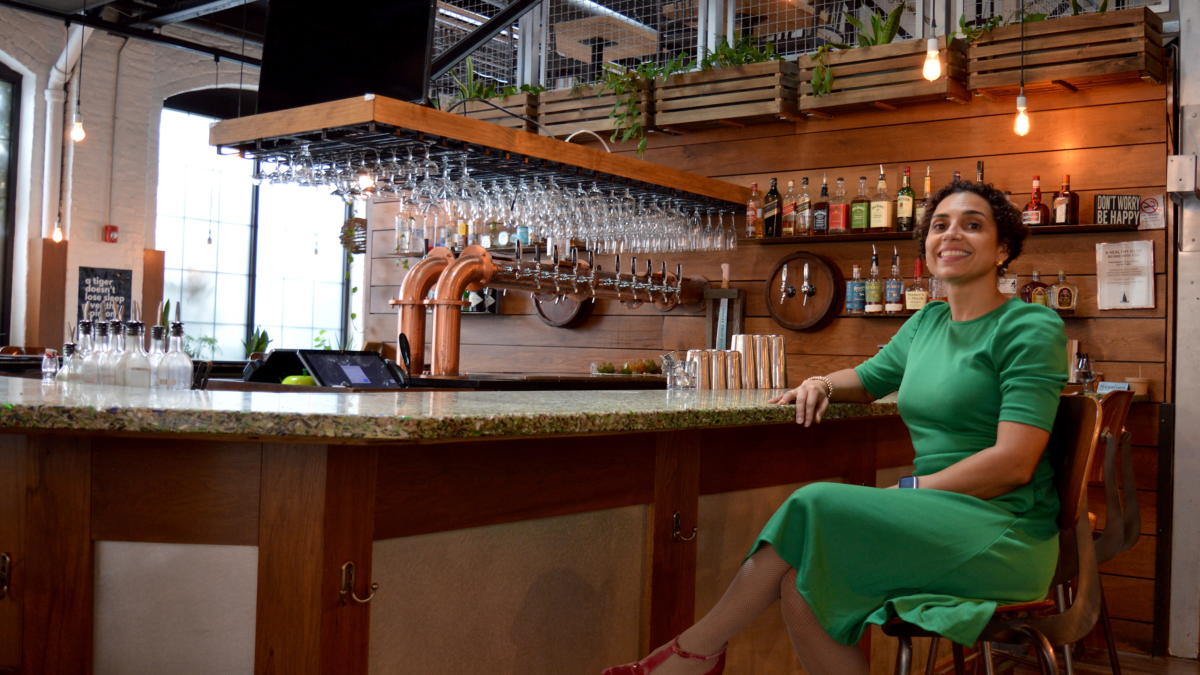Kim Bynum always prefers to look at the positive.
As of December 2019, there was no conclusive number on just how many black-owned businesses there are in Philadelphia. Data from the Pew Charitable Trusts noted that black-owned businesses amount for one in every 40 businesses – just 2.5 percent – in Philadelphia.
But Bynum, co-owner of North Broad sustainable soul food restaurant Green Soul, looks at these figures and doesn’t see data that is inconclusive, she sees data that shows tremendous growth opportunity and potential for what’s to come – if given an equal playing field.
“Well, I think recently I just heard that there is one black-owned business for every 40 businesses in Philadelphia, 2.5 percent, but I’d like to focus on the positive in that because I do feel a trend growing,” said Bynum, who, as a collective that also features chef-restaurateurs Robert and Ben Bynum, have roots all over the city with establishments like SOUTH Jazz Kitchen and Bar, Warmdaddy’s, Relish and the former Zanzibar Blue.
The trend Bynum refers to is the rising number of startup entrepreneurs, small black businesses with no employees, and the number of black and brown people working for themselves in the city’s robust gig economy. All of which are variables Pew noted in a recent interview with the Philadelphia Tribune as data difficult to take into account in the compilation of its annual “State of the City” report.
“Green Soul is only a year and a half old, but we’ve done business [in Philadelphia] for 10 years,” said Bynum. “I’ve seen a lot of things change in those 10 years. The idea of, you know, having a healthy soul food restaurant 10 years ago was mindblowing. There’s diversity in the types of businesses we’re bringing to the table and the impact they’re making is being felt. To me, that’s the takeaway.”
But ask Bynum what the real metric is when talking about the black impact on Philadelphia, a demographic that makes up close to 50 percent of the city’s total population, and it’s without question the level of appreciation from the community for the work black businesses like hers have brought to the table.
“People love our food, people love our music, other people love our fashion. I mean, it’s historic in nature. It’s up to us to continue to be the trendsetters in a lot of those arenas.”
– Kim Bynum, co-owner of North Broad-based restaurant, Green Soul
“We’re a black-owned enterprise, but walking into [Green Soul] and seeing the diversity that works here, that dines here, it’s inspiring,” said Bynum. “We make delicious food from sustainable resources. That’s something that whether you’re Muslim or Jewish, Black or White, Latino you can relate to.
We [as ownership] see that when we walk in here and there’s a great sense of pride that comes from that. I think the greatest pride comes from people appreciating what it is we’re trying to do, particularly at Green Soul. We’re making that small difference in what they’re habitually used to seeing from a soul food restaurant and it’s resonating.”
But while there’s an overwhelming sense of appreciation for the black business community from Philadelphia at-large, the number of the city’s black and brown businesses still pales in comparison to its racial makeup. In a city comprised of 43 percent of people that identify as black or brown, the resources to help spur black business is slow and hard to obtain.

Some even opine so slow that the argument for structural racism is a legitimate one.
“You can have this great idea but that’s just the start of it,” said Bynum. “Finding backing for it and having [an entity] who believes in you and backs you, why is that still so hard?”
While resources may be slow, the cultural influence that black and brown people have made on society is indisputable. It’s this, that again, Bynum sees as upside and as the continued collective push black entrepreneurs and small businesses need to present when looking for their seat at the table. There is a way that the maturation of generational wealth among Philadelphia’s black and brown inhabitants and the continued growth of Philadelphia’s economic engine can co-exist in tandem.
Entrepreneurs like Kim Bynum and the Bynum family serve as proof of the possibilities.
“It’s a big world, but a lot of what we see today in terms of culture, cuisine, fashion has been started by our people,” said Bynum. “We’ve imparted a lot of good in our society. People love our food, people love our music, people love our fashion. I mean, it’s historic in nature. It’s up to us to continue to be the trendsetters in a lot of those arenas.”





